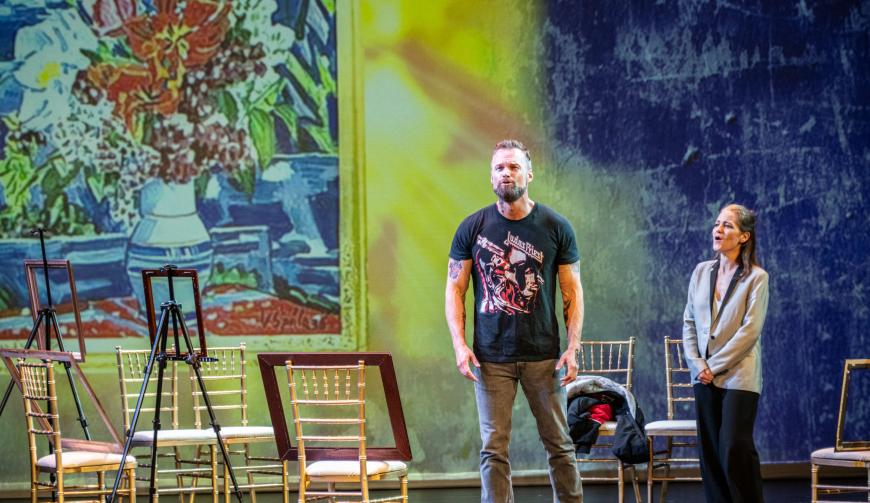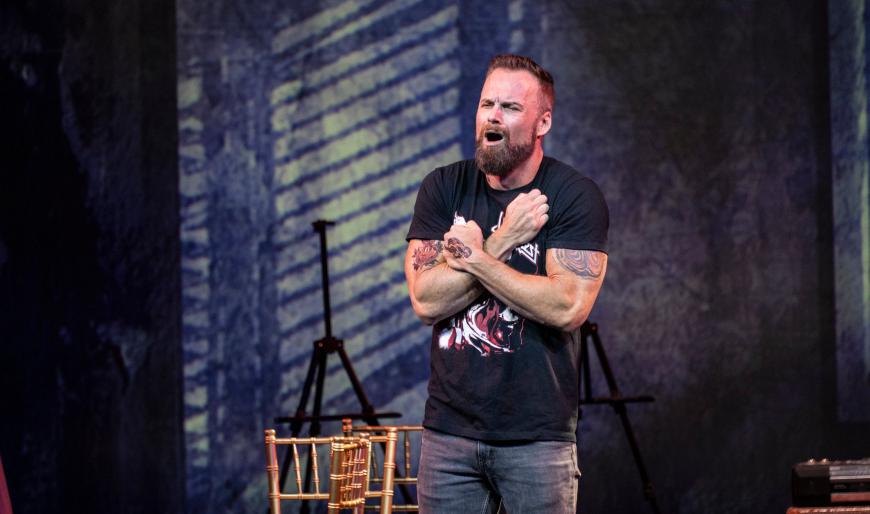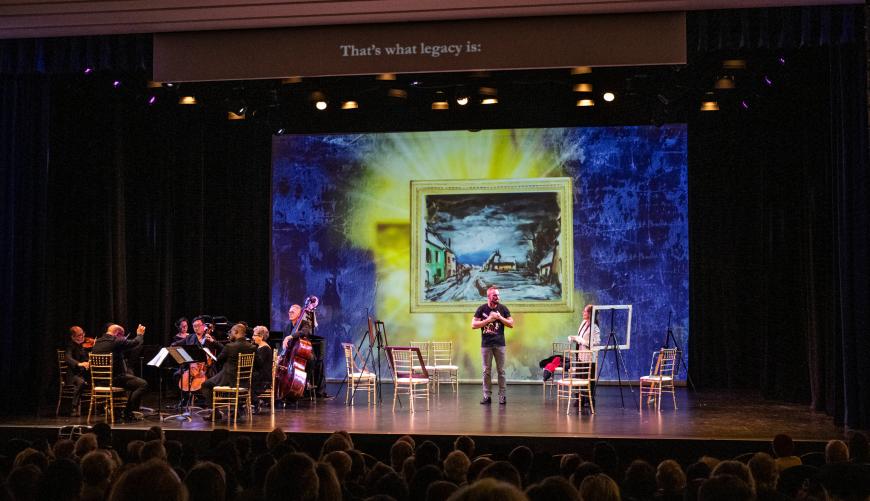
It happened one night in Chicago, when composer Jake Heggie was having dinner with the journalist and author Howard Reich, who recounted a story he had reported some 20 years before. The son of two Holocaust survivors, Reich had tracked down a Vietnam veteran who was the sole heir to a valuable art collection that had been looted by the Nazis and was then held at a museum in Prague. Not only did the vet, Gerald “Mac” McDonald, not know about the art, he was innocent of his Jewish family roots as well.
Heggie, a composer singularly attuned to the power of narrative (his previous operas include Dead Man Walking and Moby-Dick), knows when a great story has found him. The resulting one-act opera, Before It All Goes Dark, played the Presidio Theatre on Wednesday, May 22, in the middle panel of a three-city world-premiere tour. The work, with a libretto by longtime Heggie collaborator Gene Scheer, is the team’s fifth commissioned by Music of Remembrance, a Seattle-based organization devoted to music of and about the Holocaust.
The evening, which began with a heartfelt onstage conversation between Heggie and Reich, moderated by Mina Miller, and included a salon of period music by Czech composers who died in the concentration camps, offered a striking fusion of intensity and emotional range, historical context and dramatic immediacy.

In a compelling lead performance, bass-baritone Ryan McKinny fully embodied “Mac,” the burly but fragile vet saddled with hepatitis C, PTSD, and a bleak sense of isolation, made manifest in a tense, melodically angular exchange with a woman who may have been his only social contact (mezzo-soprano Megan Marino, who played multiple roles).
In a moment of eponymous foreshadowing, Mac seems poised at a fraught precipice — “the last thing you reach for, before it all goes dark.” Heggie spins out the line in a long, poignant melisma that links Mac to his Jewish Uncle Emil, who collected the art before the Nazis took his paintings as well as his life.
The instrumental music, performed by an onstage chamber ensemble under sensitive conductor Joseph Mechavich, smoothed over some talky exposition early on. Touches of humor — a reference to the basketball legend Michael Jordan — helped as well.
When the action shifted to Prague, Before It All Goes Dark found its sure footing. Scheer’s libretto marries Mac’s unvarnished vernacular (“That painting is cool”) to lyrical meditations on the power of art to “make the invisible visible.” The yearning vocal lines and febrile instrumental score, pulsing with apprehension or touched by a plaintive folk tune voiced by clarinetist Laura DeLuca, both served and heightened Mac’s encounter with the art.

As projections of the paintings swam on the screen behind him, McKinny gave Mac’s damaged demeanor a sheen of wonder and delight. Marino, as a curator at the museum, joined him in several gratifying duets. Legacy, they concurred, means “whispers that only family can hear.”
As Reich reported the real story, Mac knew before he traveled to Prague that the Czech Culture Ministry had claimed the collection as a national treasure that couldn’t leave the country. In the opera, that information comes as a stunning reversal when Mac is about to take possession of his inheritance. His return to Chicago is a mordant but suggestive coda about a man who has learned, in discovering his Jewish heritage and his rapturous experience with art, “who I really am.”
The evening delivered a rich experience. Preceding the opera with the well-played salon music, with its folk melodies and tangos, jazz riffs, and shades of Béla Bartók, established a musical backstory Heggie tapped. Engaging as Before It All Goes Dark was as a chamber opera, the potential for a full-length treatment is there. Heggie and Scheer have discovered an expansive story of layered themes that both captures and transcends its source material.
Corrections: This article has been updated to reflect that Howard Reich was one of the speakers during the onstage conversation and to correct a detail about Gerald McDonald’s biography.




